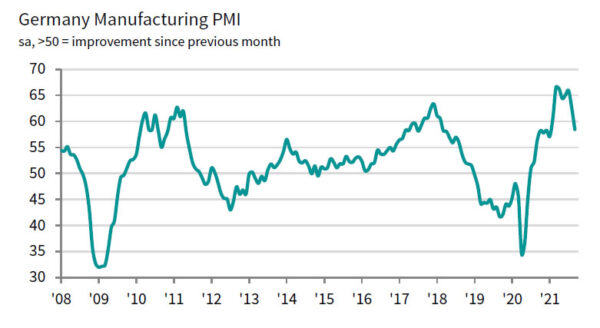Germany PMI Manufacturing was finalized at 58.4 in September, down from August’s 62.6. Markit said output and new orders rose at slowest rate in 15 months. Input shortages continued to push up costs, leading to higher output prices. Pace of job creation slowed as growth expectations dipped to 13-month low.
Phil Smith, Associate Economics Director at IHS Markit, said:
“At 58.4, the latest headline PMI reading gives a false impression as to the manufacturing sector’s current performance, with the suppliers’ delivery times component continuing to distort the picture. Trends in output and new orders are weaker than the headline number suggests.
“The unprecedented supply shortages we’ve seen in recent months have been holding back production levels for some time now, and we’re increasingly seeing this disruption feed back up the supply chain and resulting in reduced demand for intermediate goods as orders are either postponed or cancelled. As a result, overall growth in new orders dropped to a 15-month low in September.
“At the same time, supply bottlenecks continue to drive up input costs and, in turn, put pressure on manufacturers to raise prices, which is acting as another headwind to growth. The rate of input price inflation looks like it might have peaked but is still running close to the fastest in the survey’s history, leading to near-record numbers of goods producers raising prices.
“Manufacturers’ optimism towards the outlook is steadily ebbing away, down in September to its lowest for 13 months, with many firms concerned that supply shortages will persist into next year.”

